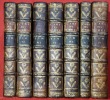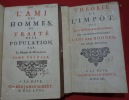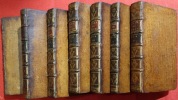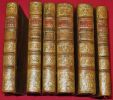-
Type
Autograph (1)
Book (793)
Magazine (3)
Music sheets (1)
-
Latest
Last 24h (5)
Last 3 days (4)
Last month (3)
Last week (1)
-
Century
18th (111)
19th (95)
20th (140)
21st (7)
-
Countries
Belgium (20)
Canada (6)
Côte d'Ivoire (2)
Denmark (2)
France (721)
Germany (9)
Italy (1)
Netherlands (4)
Switzerland (33)
-
Syndicate
ALAC (6)
CLAM (3)
CLAQ (1)
CNE (5)
ILAB (428)
NVVA (14)
SLACES (10)
SLAM (402)
SNCAO (13)
L'ami des hommes ou traité de la population. Suivi de : La théorie de l'Impôt
1758 La Haye, Benjamin Gibert, 1758-1762, 7 tomes en 7 vol. in 12 de (2)-274-(2) pp. ; (2)-363-(1) pp. ; 374-(2) pp. ; (4)-475-(1) pp. ; VIII-218-(6) pp. ; (2)-372 pp. ; VI-(2)-352 pp., la "Théorie de l'impôt" est à la date de 1761 et forme le 7e volume de la série, rel. d'ép. plein veau brun moucheté, dos à nerfs ornés de fers dorés, pièces de titres rouges, charnières fragiles, la pièce de titre de la Théorie de l'Impôt manque, les 3 premiers volumes sont à la date de 1758, le 4e à la date de 1759 et le 5e et le 6e à la date de 1762, bon ex.
Édition complète de L'Ami des hommes, le plus célèbre des ouvrages de Victor Riquetti de Mirabeau (1715-1789), père de l'orateur révolutionnaire. Seconde édition pour les 3 premiers volumes. La première édition parut à partir de 1756. D’après l’auteur la vraie richesse ne consiste que dans la population. Or la population dépend de sa subsistance, et la subsistance ne se tire que de l’agriculture. Ainsi pour ce physiocrate convaincu, tout dépend de l’agriculture. Mirabeau se range derrière l’idée que plus vous faites rapporter à la terre et plus vous la peuplez.
Lettres sur la Dépravation de l'Ordre légal. Première Partie. Suivi de : Lettres sur la Restauration de l'Ordre légal. Seconde Partie.
Amsterdam, J. H. Schneider, 1769 In-12 de (3) ff., 186 pp., (2) ff., 256 pp., veau moucheté, double filet doré, roulette et filets à froid en encadrement sur les plats, dos à nerfs plats ornés de filets dorés, pièces de titre de maroquin rouge, roulette sur les coupes, tranches mouchetées rouges (reliure de l'époque).
"Édition originale très rare. Elle rassemble 10 des 18 Lettres parues dans les Éphémérides du Citoyen, de septembre 1767 à juin 1769. Il faudra attendre 1775 pour voir la première édition complète, publiée à Berne par la Société typographique (voir n° ZZ). La première partie comprend les lettres 1 à 5 sur la Dépravation de l'Ordre légal ; la seconde, les lettres 7 à 11 sur la Restauration de l'Ordre légal, c'est-à-dire sur la propriété, la liberté, la sûreté, les principes de législation, et l'autorité souveraine. Outre leur pagination distincte, les deux parties possèdent une page de titre propre, imprimée en rouge et noir. La première est ornée d'un vignette historiée gravée sur cuivre, la seconde d'un fleuron sur bois. L'ouvrage a été imprimé avec permission tacite chez Jean Herman Schneider à Amsterdam. Il existe deux états de la page de titre : l'un avec la fausse adresse ""A Londres, chez Wilcox"" et l'autre, comme celui que nous présentons, avec celle véritable du libraire. Notons que Schneider a imprimé la même année un Discours de Mr. J. J. Rousseau de Geneve ; Qui n'a point encore été imprimé, sur cette question. Quelle est la vertu la plus nécessaire aux Héros ; & quels sont les Héros, à qui cette Vertu a manqué ? Sans que cette pièce fasse partie ou soit nécessaire à l'édition (cf. Scheler), on la trouve parfois relié avant les Lettres du marquis de Mirabeau. La proximité putative entre les deux texte explique sans doute que le nom de Rousseau soit inscrit sur la pièce de titre de notre exemplaire comme auteur des dites Lettres. Celui-ci est par ailleurs bien complet des trois dernières lettres de la seconde partie qui font parfois défaut (cf. ex. 337818 Bm de Lyon et L. Scheler). ""Cet ouvrage expose en détail la philosophie morale des physiocrates. À savoir que l'ordre physique social n'est pas autre chose que l'ordre économique ; et l'ordre économique tout entier est impliqué dans l'économie agricole"" (G. Weurlersse, Le Mouvement physiocratique en France , 1756-1770). Bel exemplaire en reliure hollandaise de l'époque. Tchemerzine, Editions originales et rares XVe-XVIIIe siècles, IV, 757 (note de L. Scheler). - I.N.E.D., 3201 pour l'édition de 1775."


(CNE)
Phone number : + 33 (0)1 42 89 51 59
Théorie de l'Impot
1761.Pas de lieu.Gd.in-12 br.422 p.BE.intérieur.Brochage d'attente en état très moyen.
Théorie de l'impôt
1760 Sans lieu, Sans nom d'édit., 1760, in 12 de VIII-520 pp., rel. d'ép. plein veau brun marbré, dos à nerfs orné, pièce de titre de mar. vert, bel ex.
Edition publiée la même année que l'originale. "Mirabeau y développe les principes de la nouvelle école, avec un francparler qui lui attira de nombreux suffrages...et le fit emprisonner. Il s'élève notemment contre les fermiers généraux, fait une critique sévère du régime fiscal alors en vigueur, et énonce trois conditions nécessaires à une judicieuse imposition." (INED 3209).
Théorie de l'impôt, ou moyens surs et faciles de diminuer les impôts sur le Peuple et d'augmenter les revenus de la Couronne, en supprimant les douanes, aides, octrois etc. Avec : Doutes proposés à l'auteur de la Théorie de l'impôt
Cuir Paris 1761
Très bon 2 volumes in-12. Mirabeau : VIII, (1) - 413 pages. Pesselier : X, 1 f., (1) - 204 pages, mouillures marginales en fin de volume, ex-libris : "Car. de Beaurepaire". Plein veau, dos ornés, tranche peinte en rouge (Mirabeau) et en bleu (Pesselier). Réunion de la proposition de Mirabeau, ici en réédition, et de celle de son contradicteur, Pesselier.
L'AMI DES HOMMES. Cinquième partie. Mémoire sur l’agriculture. Envoyé à la très-louable Société d’Agriculéture de Berne, Avec l’Extrait des six premiers livres du Corps complet d’OEconomie Rustique de feu M. Thomas Hale.
s.n., s.l., Mil sept cent soixante, 1760, in-8vo, XII + 298 p. + 4 ff. (dern. blanche), reliure en plein veau d’époque, dos à nerfs orné, pièce de titre, caissons et fleurons dorés, pièce de titre rouge, tomaison avec ‘Tom. VI’, tranches rouges,
Image disp.

(SLACES, NVVA)
Phone number : 41 (0)26 3223808
MIRABEAU, Victor Riquetti, marquis de Mirabeau - QUESNAY, François.
Reference : 102463
L'Ami des Hommes, ou Traité de la Population (6 volumes).
A Hambourg, chez Chrétien Hérold, Libraire, 1762-1764, 8 parties reliées en 6 volumes in-12 de 170x100 mm environ, de 300 à 400 pages par tome, pleine basane marbrée fauve, dos à nerfs portant titres et tomaisons dorés, ornées de caissons à fleurons et motifs dorés, coupes dorées, tranches jaspées, complet des 6 tableaux dépliants dans le tome I. Frottements et petites épidermures sur le cuir, coins émoussés, petits trous de ver sur le dos de 2 volumes (t. I et II), des tampons et ex-libris sur les pages de titres, une page de titre restaurée, quelques rousseurs légères, sinon bon état.
Victor Riquetti de Mirabeau, marquis de Mirabeau, dit « l'ami des hommes », né à Pertuis le 5 octobre 1715, et mort à Argenteuil le 13 juillet 1789, est un économiste et philosophe français. Il est le père de Honoré-Gabriel Riqueti de Mirabeau, l'une des grandes figures de la Révolution française. François Quesnay, né le 4 juin 1694 à Méré et mort le 16 décembre 1774 à Versailles, est un médecin et économiste français, penseur du roi Louis XV et l'un des fondateurs de la première école en économie, l'école des Physiocrates. Il est l'auteur du Tableau économique (1758), qui est la première représentation schématique de l'économie. Tome I : I. Société, Richesses, - II. La mesure de la Subsistance est la mesure de la Population, - III. L'Agriculture, qui peut seule multiplier les Subsistances, est le premier des Arts, - IV. Avantages de la France relativement à l'Agriculture, - VI. De la nécessité & des moyens d'encourager l'Agriculture, - VII. L'emploi que l'on fait des terres, dépend des moeurs & usages, - VIII. Travail & Argent, viij-308 pages avec 6 tableaux dépliants. Tome II : I. Le Commerce, - II. Circulation, - III. Justice & Police, - IV. Les Moeurs, - V. Du Luxe, - VI. Age de la France, - VII. Reversement, - VIII. L'argent doit-il être une Marchandise, ou non ?, 423 pages - Tome III : Ce qu'est le Commerce étranger, la nécessité, & sur quel plan il faut s'en faire une idée - II. De quelle nature d'effets doit être le Commerce étranger, - III. De Communications, & des Ports, - IV. De la Marine Militaire, la nécessité, les moyens de la rendre florissante, & de la borner, - V. Prohibitions, - VI. Des Colonies, - VII. De la Paix & de la Guerre, - VIII. & dernier : Résumé général de tout l'Ouvrage, 422 pages, - Tome IV : Volume I. Précis de l'Organisation, Ou Mémoire sur les Etats Provinciaux, -Volume II. Réponse aux objections contre le Mémoire sur les Etats Provinciaux, 208-2ff-336 pages. - Tome V : Cinquième Partie : Mémoire sur l'Agriculture envoyé à la Tres-Louable Société d'Agriculture de Berne : Avec L'Extrait des six premiers Livres du Corps complet d'Economie Rustique de Feu M. THOMAS HALE, Sixième Partie : Réponse à l'Essai sur les Ponts et Chaussées, La Voirie et les Corvées, 281-2ff-206 pages, - Tome VI : Septième Partie : Tableau Economique avec ses Explications, Huitième Partie : L'Ami des Hommes nouvelle Edition, Augmentée des Lettres sur les Corvées, & la Milice, Lettres pour servir de Suite à L'Ami des Hommes4ff-162-2ff-102 pages. Merci de nous contacter à l'avance si vous souhaitez consulter une référence au sein de notre librairie.
Mme de Staal - Voltaire - Mirabeau - Mme du Deffand - Mlle de Lespinasse - Mme d'Epinay - Frédéric II - Mme Roland - Catherine II - Le Prince de Ligne
Reference : 48317
Les épistoliers du XVIIIe siècle, extraits
La Renaissance du Livre sd, in-12 relié demi-cuir à coins, dos à nerfs orné, tête dorée, 220pp - très bon état
Extrait d'un Discours de M. **** adressé à M. de Mirabeau, sur les Mœurs.
1790 en ff. plaq. in-12, 8pp., Orange 1790
" C'est à votre âme et non à votre plume que l'on demande des mœurs…"
Phone number : 33 (0)6 77 77 12 33
MIRABEAU. " L'ami des hommes ".
Paris, Perrin, 1992. In-8, broché, couverture illustrée, 324 pp.
Bel exemplaire. Photos sur demande.
MOUNIER, DEMEUNIER, MIRABEAU (Vicomte de), EYMAR (l'abbé de), NANCY (évêque de), BUREAUX DE PUZY, FAYDEL, LOUIS XVI (de Saint-Priest)
Reference : 5421
Déclaration du Roi, portant sanction du Décret de l'Assemblée Nationale, du mardi 6 octobre 1789, concernant la contribution patriotique.
1789, Poitiers, Michel-Vincent Chevrier, impr. du Roi – in-4, 8 pp – cahier.
Bon ex.
Déclaration des droits de l'Homme, et articles de Constitution présentés au roi, avec sa réponse du 5 Octobre soir. [Extrait des procês-verbaux de l'Assemblée Nationale, Des 20, 21, 22, 23, 24, 26 Aout & premier Octobre 1789. Déclaration des droit... - [""MEN ARE BORN AND REMAIN FREE AND EQUAL IN RIGHTS""]
Paris, Chez Baudouin, Imprimeur de l'Assamblée Nationale, 1789. 8vo. Bound in an exquisite later red half morocco with gilt spine. Top edge gilt. (1) f. (title-page), 8 pp. (""Déclaration des droits de l'Homme en société""), 6 pp. (""Articles de Constitution""), (1) f. (""Réponse du Roi""), (1) f. (blank). Woodcut head-pieces. Title-page slightly bowned, otherwise in excellent condition. A truly excellent copy.
The exceedingly scarce true first printing, in an incredibly rare form of off-print/separate printing, of one of the most important and influential documents in the history of mankind, namely the French Human Rights Declaration, containing also the articles for the first French Constitution. This groundbreaking publication constitutes a monumental change in the structure of the human world, providing all citizens with individual rights that we now take for granted. This monument of humanist thought appeared in the ""Procès verbal de l'Assemblée Nationale"", copies of which are also very difficult to obtain. There, however, the two parts appeared without a title-page and without the final blank, which together constitute a form of wrappers for this off-print/separate printing, of which only five or six other copies are known and which is present in merely one or two libraries world-wide. As far as we now, only one other copy has been on the private market, and that did not have the blank back wrapper. This exceedingly rare separate printing of the Human Rights Declaration, with the Constitution, was intended for the inner circle of those participating in its creation and was limited to a very restricted number of copies - all of which will have been owned by the creators of the Declaration. This epochal document is just as important today as it was when it was formulated during the French Revolution in 1789, and since 2003, the Declaration has been listed in the UNESCO Memory of World Register - ""This fundamental legacy of the French Revolution formed the basis of the United Nations Declaration of 1948 and is of universal value"". Few other documents in the history of mankind has done as much to determine the way we live and think, the way Western societies are structured and governed, and few other documents have had such a direct impact upon our constitutional rights and the way we view ourselves and others in society. It is here that we find the formulation of liberty and equality upon which so much of Western political and moral thought is based - that all ""men are born and remain free and equal in rights"" (Article 1), which were specified as the rights of liberty, private property, the inviolability of the person, and resistance to oppression (Article 2)" that all citizens were equal before the law and were to have the right to participate in legislation directly or indirectly (Article 6) no one was to be arrested without a judicial order (Article 7)" Freedom of religion (Article 10) and freedom of speech (Article 11) were safeguarded within the bounds of public ""order"" and ""law"", etc., etc.The content of the document that were to change the Western world for good emerged largely from the ideals of the Enlightenment. ""The sources of the Declaration included the major thinkers of the French Enlightenment, such as Montesquieu, who had urged the separation of powers, and Jean-Jacques Rousseau, who wrote of general will-the concept that the state represents the general will of the citizens. The idea that the individual must be safeguarded against arbitrary police or judicial action was anticipated by the 18th-century parlements, as well as by writers such as Voltaire. French jurists and economists such as the physiocrats had insisted on the inviolability of private property."" (Encycl. Britt.).The key drafts were prepared by Lafayette, working at times with Thomas Jefferson. In August 1789, Honoré Mirabeau played a central role in conceptualizing and drafting the Declaration. On August 26, 1789, in the midst of The French Revolution, the last article of the Declaration was adopted by the National Constituent Assembly, as the first step towards a constitution for France. ""In 1789 the people of France brought about the abolishment of the absolute monarchy and set the stage for the establishment of the first French Republic. Just six weeks after the storming of the Bastille, and barely three weeks after the abolition of feudalism, the Declaration of the Rights of Man and of the Citizen (French: La Déclaration des Droits de l'Homme et du Citoyen) was adopted by the National Constituent Assembly as the first step toward writing a constitution for the Republic of France.The Declaration proclaims that all citizens are to be guaranteed the rights of ""liberty, property, security, and resistance to oppression."" It argues that the need for law derives from the fact that ""...the exercise of the natural rights of each man has only those borders which assure other members of the society the enjoyment of these same rights."" Thus, the Declaration sees law as an ""expression of the general will,"" intended to promote this equality of rights and to forbid ""only actions harmful to the society."" (www.humanrights.com). This sensational document became the crowning achievement of the French Revolution"" it came to accelerate the overthrow of the ""Ancien Régime"" and sowed the seed of an extremely radical re-ordering of society. The Declaration interchanged the pre-revolutionary division of society -in the clergy, the aristocracy, and the common people- with a general equality - ""All the citizens, being equal in [the eyes of the law], are equally admissible to all public dignities, places, and employments, according to their capacity and without distinction other than that of their virtues and of their talents"" (From Article VI), upon which today's society is still based. It is hard to imagine a work that is more important to the foundation of the society that we live in today.
Emilie de Marignane, comtesse de Mirabeau - Conférence faite à la société des "Amis du vieux Toulon", le 9 janvier 1926 -
Toulon : Imprimeries toulonnaises, 1936 - In-12 broché de 23 pages - bon état - Envoi autographe signé de l'auteur -
Tous nos livres sont visibles sur notre site : https://www.livrepoesie.com/
Les Quatre Grands Historiens Latins;Cesar-Salluste -Tite-Live-Tacite suivi de Vingt deux mois de la vie de Mirabeau,
Paris Michel Levy Freres 1874;in-12, br., 402p.
Remise de 20% pour toutes commandes supérieures à 200 €
Lanterne magique nationale [numéro 1]
s.l., [1790] Ceci est le premier numéro d'une publication qui n'en eut que quatre, 38pp., 23cm., reliure cart. avec qqs. traces d'usage, quelques rousseurs, état convénable, rare, [cfr. HATIN, Bibl. de la presse, p.180 & Histoire de la presse t.VII p.10, ainsi que Drujon, Les livres à clef t.I p.532], G86861
Journal D'une femme De Chambre
Bookking International broché Bristol illustré 1994 415 pages en format 12 - 19 cm 2-87714-167-5
Bon État
Le journal d'une femme de Chambre
Bibliothèque Charpentier. 1952. In-12. Broché. Bon état, Couv. convenable, Dos satisfaisant, Intérieur bon état. 351 p. Petit maque en coiffe de tête et pied. petit tache sur le 1er plat. . . . Classification Dewey : 840.091-XX ème siècle
Roman Classification Dewey : 840.091-XX ème siècle
LE JOURNAL D UNE FEMME DE CHAMBRE
CHARPENTIER. 1920. In-12. Broché. Etat d'usage, Tâchée, Dos satisfaisant, Intérieur frais. 517 pages.. . . . Classification Dewey : 800-LITTERATURE (BELLES-LETTRES)
Classification Dewey : 800-LITTERATURE (BELLES-LETTRES)
Le Journal d' Une Femme De Chambre
Fasquelle Editeur broché Couverture Illustrée Paris 1952 351 pages en format -12
Bon État
Le Journal D'une femme De Chambre
Le Club français Du livre Paris Ed. Numérotée 6062/7000 1957 382 pages en format 14 - 21 cm - reliure rigide en percaline avec illustration en couleur en étiquette
Bon État
[PAMPHLET CONTRE CAMILLE DESMOULINS] MIRABEAU (André-Boniface-Louis Riqueti de)
Reference : 226631
Dénonciation de quelques extraits, d'un ouvrage ayant pour titre : Révolution de France & de Brabant. par Camille Desmoulins, de la Société de la Révolution
Paris, Chez Gattey, 1790 in-8, 23 pp., dérelié.
Rare."Ces extraits sont pris au hasard ; on a cherché à recueillir que ceux qui attaquaient directement le roi ou l'autorité royale."Martin & Walter, III, 24392. - - VENTE PAR CORRESPONDANCE UNIQUEMENT - LIEN DE PAIEMENT, NOUS CONSULTER.
Lettre sur l'invasion des Provinces-Unies, à M. le Comte de Mirabeau, et sa réponse. publiées par la Commission que les Patriotes Hollandais ont établie à Bruxelles
Bruxelles, 1787 in-8, 20 pp., broché.
Attaques contre Mallet du Pan et le "despotisme de la Maison d'Orange". La Commission établie à Bruxelles demande à Mirabeau la rédaction d'un ouvrage en faveur d'un gouvernement représentatif. Elle se propose d'envoyer à Mirabeau tous les documents nécessaires. Toutefois, Mirabeau renouvelle son attachement à la Monarchie prussienne, facteur de liberté et d'équilibre en Europe, même s'il condamne l'intervention du Roi de Prusse. L'ouvrage qu'on lui demande de rédiger lui paraît prématuré : ne convient-il pas d'attendre une situation révolutionnaire, plus propice aux intérêts des patriotes hollandais ?Rare et important. - - VENTE PAR CORRESPONDANCE UNIQUEMENT - LIEN DE PAIEMENT, NOUS CONSULTER.
Lettre sur l'invasion des Provinces-Unies, à M. le Comte de Mirabeau, et sa réponse. publiées par la Commission que les Patriotes Hollandais ont établie à Bruxelles
Bruxelles, 1787 in-8, 20 pp., broché, couv. papier bleu moderne.
Attaques contre Mallet du Pan et le "despotisme de la Maison d'Orange". La Commission établie à Bruxelles demande à Mirabeau la rédaction d'un ouvrage en faveur d'un gouvernement représentatif. Elle se propose d'envoyer à Mirabeau tous les documents nécessaires. Toutefois, Mirabeau renouvelle son attachement à la Monarchie prussienne, facteur de liberté et d'équilibre en Europe, même s'il condamne l'intervention du Roi de Prusse. L'ouvrage qu'on lui demande de rédiger lui paraît prématuré : ne convient-il pas d'attendre une situation révolutionnaire, plus propice aux intérêts des patriotes hollandais ?Rare et important. - - VENTE PAR CORRESPONDANCE UNIQUEMENT - LIEN DE PAIEMENT, NOUS CONSULTER.
Mémoires sur Mirabeau et son époque, sa vie littéraire et privée, sa conduite politique à l'Assemblée Nationale, et ses relations avec les principaux personnages de son temps.
Paris, Bossange frères, 1824 3 volumes In-8° (13,8 x 21,8cm) Brochés sous couvertures jaunes aux plats à encadrement de double filet noir à petits motifs, couronne florale au centre du 2nd. Vol.1: 1feuillet, 1frontispice, 1titre, 1faux-titre, 428p.; Vol.2: 1feuillet, 1faux-titre, 1titre, 1 second faux-titre, 414p., 1feuillet; Vol.3: 1feuillet, 1faux-titre, 1titre, 1 second faux-titre, 552p., 1feuillet. Couvertures un peu salies, fentes aux charnières du 1er volume et à la charnière supérieure du 2nd; rousseurs surtout dans le 1er volume.
Edition originale des 3 premiers tomes (sur 4) de ces anonymes "Mémoires sur Mirabeau [...]" attribués à Jacques PEUCHET (1758-1830): administrateur de la Police de septembre 1789 à août 1790 puis archiviste de la Police sous la Restauration, il eut accès à des documents non exploités; portrait en frontispice dans le 1er volume. 5è livraison des "Mémoires des Contemporains, pour servir à l'histoire de la République et de l'Empire".
PEUCHET (Jacques) - MIRABEAU (Honoré-Gabriel Riqueti [ou Riquetti] de).
Reference : 002973
(1824)
MÉMOIRES SUR MIRABEAU, et son époque, sa vie littéraire et privée, sa conduite politique à l'Assemblée Nationale, et ses relations avec les principaux personnages de son temps.
1824 Paris, Bossange Frères, 1824. Quatre volumes (142 X 224 mm) reliure à la Bradel papier vert anglais, pièces de titre et de tomaison maroquin à long grain rouge, sertis de filets dorés (reliure de l'époque). Tome I : (1), faux-titre, titre, second faux-titre, 428 pages, (1) ; Tome II : (1), faux-titre, titre, second faux-titre, 414 pages, (1) ; Tome III : (1), faux-titre, portrait, titre, second faux-titre, 552 pages, (1) ; Tome IV : (1), faux-titre, titre, second faux-titre, 418 pages, (1). Fentes aux mors, ne remettant pas en cause la solidité des reliures, rousseurs éparses.
ÉDITION ORIGINALE de ces Mémoires qui forment la cinquième livraison des "Mémoires des Contemporains", et dont la rédaction est attribuée à Jacques PEUCHET. Bien que Quérard semble douter de cette attribution, la "Biographie Universelle" apporte cependant un intéressant argumentaire, indiquant notamment que «Peuchet écrivit son texte alors qu'il était archiviste de la Police sous la Restauration ; l'admiration qu'il y montre pour Mirabeau lui valut d'être mis à la retraite d'office. Peuchet fut représentant de la Commune de Paris et l'un des membres de l'administration municipale au département de la Police qu'il géra de septembre 1789 à août 1790. Il dirigea en l'An III le "Bureau des Lois et des matières contentieuses sur les émigrés", ce qui lui permit d'avoir accès à des documents inexplorés à l'époque, et de composer un ouvrage d'un intérêt unique, ne faisant pas double emploi avec les autres mémoires publiés. » Ce texte demeure donc tout à fait intéressant lorsqu'on sait que toutes les archives de la Police ont disparu en 1871 lors de la Commune de Paris, les anecdotes citées gardant un caractère exclusif. PORTRAIT de Mirabeau gravé par Hopwood en frontispice du tome troisième, exemplaire imprimé sur papier vergé en partie non coupé. AGRÉABLE EXEMPLAIRE, conservé dans son élégante reliure d'époque de ces Mémoires recherchés. GOOD COPY. PICTURES AND MORE DETAILS ON REQUEST.


Phone number : 06 21 78 12 79
 Write to the booksellers
Write to the booksellers










